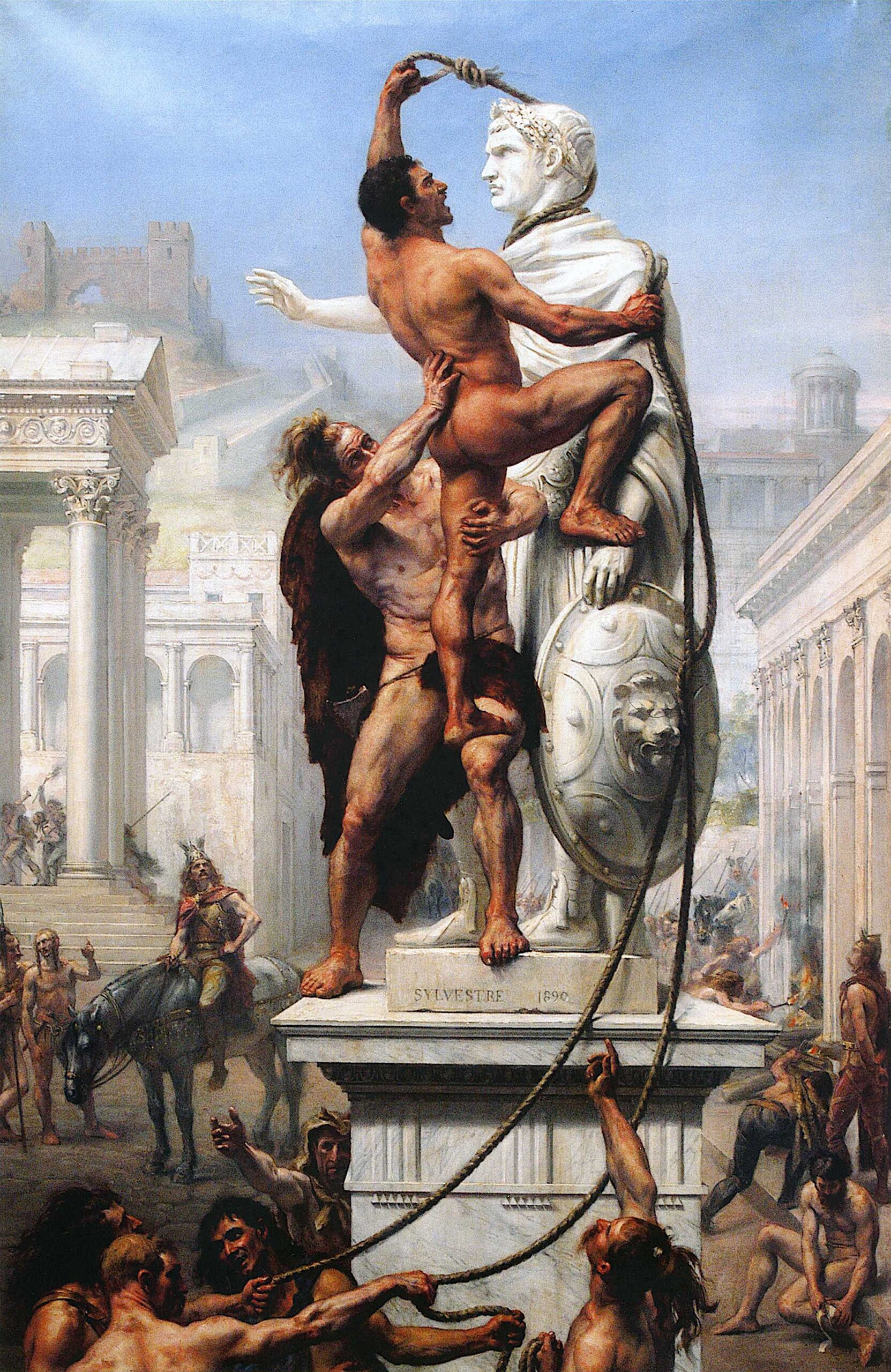Flashback: Michael Brenner envisions a conversation among four pundits of the imperium during the calamitous sack of Rome by Alaric’s Visigoths with a veiled reference to Trump’s America.

The Plunder of Rome, painting from 1890 by Joseph-Noel Silvestre. (Wikimedia Commons/Public Domain)
Setting: Rome
Date: March 411 CE
Scene: Ruins of the Diocletian Baths
Principals: Four habitués gather in the remains of the tepidarium
 The foursome is made up of local cognoscenti — self-styled pundits who gather to exchange impressions of what’s happenings in the imperial capital. All the normal chatter about the rising cost of housing, what gladiator is the GOAT [Greatest Of All Time], the relative merits of the Diocletian thermae and the Antonine thermae on the sea at Carthage, gossip on the latest political machinations and the reports from the endless war against the Sassanids in eastern Syria is eclipsed by the calamitous sack of Rome by Alaric’s Visigoths.
The foursome is made up of local cognoscenti — self-styled pundits who gather to exchange impressions of what’s happenings in the imperial capital. All the normal chatter about the rising cost of housing, what gladiator is the GOAT [Greatest Of All Time], the relative merits of the Diocletian thermae and the Antonine thermae on the sea at Carthage, gossip on the latest political machinations and the reports from the endless war against the Sassanids in eastern Syria is eclipsed by the calamitous sack of Rome by Alaric’s Visigoths.
Much of the city is scarred by their orgy of destruction, their plunder of its riches and the flight of so many patricians to safer locales. Alaric, now in complete control of the state apparatus, is moving swiftly to dismantle Rome’s venerable institutions, and desecrating the city’s famed historic monuments — replacing them with grander yet artless versions of the rude structures that mar the landscape of the Visigoth homeland.
Magnus: It’s still a shock to imagine that just seven months ago this was the most magnificent building anywhere in the Empire. Now, even a routine change of the water is no more than a fading memory. My only consolation is that it could have been worse; what if the Huns or the Vandals had done the sacking!
Romulus: You’re right — the glass is either half full or half empty depending where you focus your attention.
Gauis: Let’s be Stoic realists; the groundwork for this disgraceful collapse was done years ago — at least as far back as Constantius, that wild man. Honorius, our last emperor, was well past his prime — not that his prime was particularly luminous. Hardly able to articulate, he almost never appeared in the Senate or at the games in the Colosseum. The plebeians lost respect for imperial authority, and Romans’ mood turned sour.
Augustine: Friends, aren’t you sugarcoating a tragedy that has seen noble Rome lose its integrity, its honor and above all its independence and freedom?
Gauis: Yes, but we shouldn’t overlook the positive initiatives that Alaric has launched. For one thing, he recognizes the folly of trying to expand the Roman frontier all the way to the Euphrates. History should have counseled that the Sassanids never would countenance that; think of the fate that befell Crassus. We’re stuck in a sand trap there, and the only way out is to cut our losses — end support for the Armenian and Kurdish insurrections, strike a deal with King Yazdegerd and concentrate our resources on mounting domestic problems.
Alaric’s instincts point in the right direction despite the lack of comprehensive diplomatic strategy. His first step in making contact with Yazdegerd is a game changer. In fact, the word around the Forum is that the two leaders may meet face-to-face in Palmyra. Alaric respects Yazdegerd as a tough leader with whom he can do business. Moreover, Yazdegerd’s definitive ending of persecution of Christians within the Sassanid empire eases any pressure from his Arian base over this stunning policy reversal.
Romulus: A definite improvement over the dumb obstinacy of the Honorius crowd.

Cross-section of the Baths of Diocletian, rendering by French architect Edmond Paulin, 1880. (Wikimedia Commons/Public Domain)
Augustine: The truth is that for too long Rome has overlooked the threat to our strategic dominance of an emerging tacit alliance between Persia and the Huns. Their clear target is the Roman Empire — each for its own reasons. Just look at the latest trade statistics. The exchange of steppe horses from Central Asia for metallurgical technology from the Sassanids has increased four-fold. Our smart move would be to drive a wedge between Persia and the Huns. Reaching a modus vivendi with Persia follows logically from analysis of the emerging correlation of forces.
Magnus: What do you guys think about yesterday’s announcement that Alaric is placing 35 percent tariffs on grain imports from Egypt and Carthage? Isn’t that going to have far-reaching repercussions for the entire Mediterranean basin economic system? Above all, hasn’t Rome depended on that grain to feed the plebeians, fulfilling our longstanding commitment to provide cheap bread for all in exchange for unqualified loyalty to the emperor?
After all, the frumentatio goes back to the days of the Republic. The Bread and Circuses strategy has kept Rome peaceful and unified for centuries. I’m not sure that putting the entire burden on circuses is tenable — especially in light of the declining quality of the games. They’re not at all what they used to be — over commercialized.
Gauis: It is a bit of a gamble, but I can see where Alaric is coming from. Sometimes, you have to accept short-term pain for long-term gain. Peninsular agriculture has been languishing for generations. It badly needs the kind of infrastructure investment that tariff revenues could pay for. We must do something to revive it; otherwise, we run the risk of becoming vulnerable to political discord in supplier provinces that could disrupt deliveries.
Magnus: Why, though, impose 10 percent tariffs on imports from Gaul and 15 percent on Lusitania? And slapping a 50 percent tariff on Tuareg exports of salt? That’s the mainstay of their economy — poor devils.
Romulus: Fairness and equity; you have to go with what the analytics tell you.
Gauis: Alaric and his advisers are not as dim-witted as they sound — they must have other national security concerns on their minds
Augustine: I want to add that a touch of austerity might be just the right thing to stiffen the moral fiber of Romans. Face it, we had become pretty soft — everybody looking for handouts, a bloated bureaucracy to serve them, and bringing in hordes of barbarian immigrants to do the jobs that Romans now shirk. Crime, an epidemic of opium addiction and a drain on the Treasury is the result.
Gauis: Time to Make Rome Great Again?
Magnus: Damn! This water is getting cold. I knew that the baths would suffer when they summarily deported the maintenance guys back to DACIA!
Postscript: In 476 Rome breathed its last — a degraded, impoverished Rome. Europe’s 600-year Dark Ages followed.
Michael Brenner is a professor of international affairs at the University of Pittsburgh, mbren@pitt.edu
The views expressed are solely those of the author and may or may not reflect those of Consortium News.

History does NOT repeat itself. The US republica may resemble the Roman Republic in it’s last daus. but not the Late Empre, 400s AD.
On Target!
Well, we are all still taking a bath, for now.
I can’t help but notice the Roman stringing up the Representation of leadership, looks very familiar.
We are still at it. We do not need to learn from history we are designed to repeat it.
I hope he gets off. Possible martyr (I hope not)
thank you so much, michael brenner,
for making me smile with this amusing scenario and for your
reference to the 600-year dark ages that followed rome’s fall!
unfortunately, i am quite sure that the folks in high places,
upon reading the scenario and the reference, won’t see
themselves and their mistakes reflected in either, and they
will see no need to change their ways.
it would be up to the plebeian masses to effect real change.
I don’t know much about Rome but somehow sensed it would be funny .
Started laughing a few paragraphs in the play .
Now I need to try to understand the real characters philosophies.
I think I spotted Biden and Trump ?
Does history repeat itself ?
I need a bath .
Was it too much work back then to put on some clothes?
“When I despair, I remember that all through history the way of truth and love has always won. There have been tyrants and murderers and for a time they seem invincible, but in the end, they always fall… think of it, always.” — Ghandi
Thankfully, the Imperial Romans were one that fell.
Wow!